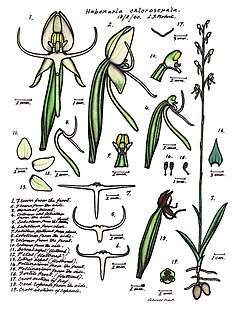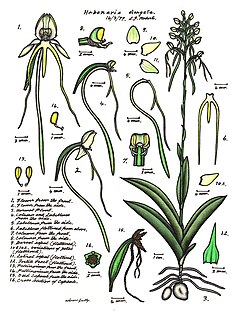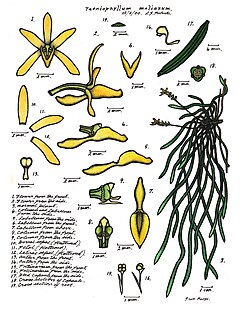
Dipodium stenocheilum, commonly known as tropical hyacinth-orchid, is a leafless saprophytic orchid that is endemic to northern Australia. For most of the year the plant is dormant but in summer it produces a tall flowering stem with up to twenty five white flowers with purple spots and a mauve labellum.

Habenaria chlorosepala, commonly known as the green-hooded rein orchid, is a species of orchid that is endemic to a small area in far north Queensland. It has two or three leaves at its base and up to twenty small green and white flowers.

Habenaria elongata, commonly known as the white rein orchid, or Kimberley spider orchid, is a species of orchid that is endemic to northern Australia. It has up to four leaves at its base and up to twenty small white flowers with yellowish tips and thread-like lobes on the labellum.
Habenaria euryloba, commonly known as the small rein orchid, is a species of orchid that is endemic to a small area in far north Queensland. It has two or three leaves at its base and up to twenty small white flowers with a trident-like labellum.

Habenaria exilis, commonly known as the wispy rein orchid, is a species of orchid that is endemic to a small area in far north Queensland. It usually has two leaves at its base and up to fifteen tiny whitish flowers.
Habenaria ferdinandi, commonly known as the yellow rein orchid, is a species of orchid that is endemic to the Northern Territory. It usually has two leaves at its base and up to fifteen tiny yellowish green, strongly scented flowers.
Habenaria fuscina, commonly known as the green rein orchid, is a species of orchid that is endemic to Cape York Peninsula. It has two or three leaves at its base and up to fifteen small green and white flowers with a labellum shaped like a trident.
Habenaria halata, commonly known as the sweet rein orchid, is a species of orchid that is endemic to northern parts of the Northern Territory. It has two or three leaves at its base and up to eighteen small white, sweet-smelling flowers with a labellum shaped like a trident.

Habenaria propinquior, commonly known as the common rein orchid, is a species of orchid that is endemic to north Queensland. It has two to four leaves at its base and up to thirty white flowers with thread-like lobes on the labellum.

Habenaria rumphii, commonly known as the stiff rein orchid, is a species of orchid that is widespread and common in Southeast Asia, New Guinea and northern Australia. It has six or seven leaves on the lower part of its stem and up to thirty white flowers with one long and two short lobes on the labellum.
Habenaria macraithii, commonly known as the whiskered rein orchid, is a species of orchid that is endemic to a small area in far north Queensland. It has up to eleven scattered leaves and up to twenty five relatively large green flowers with thread-like petal lobes.
Habenaria praecox, commonly known as the early rein orchid, is a species of orchid that is endemic to the north coast of Queensland. It has between two and four narrow, upright leaves at its base and up to thirty five small white flowers with a green dorsal sepal.
Habenaria triplonema, commonly known as the twisted rein orchid, is a species of orchid that is endemic to northern Australia. It two or three leaves at its base and up to twenty five yellowish, strongly scented flowers.

Habenaria xanthantha, commonly known as the freak rein orchid, is a species of orchid that is endemic to far northern Queensland. It has two or three leaves at its base and up to twenty small white flowers often lacking the nectary spur present on other species in the genus.
Dendrobium litorale, commonly known as the coastal shaggy orchid, is an epiphytic orchid in the family Orchidaceae. It has a very short rhizome with crowded, slender stems with most of the leaves in the lower half. The leaves are flattened and pointed, the flowers small and pale greenish cream-coloured. It occurs on islands in the Torres Strait and in New Guinea.
Dendrobium maidenianum, commonly known as the coastal burr orchid, is an epiphytic or lithophytic orchid in the family Orchidaceae and is endemic to tropical North Queensland, Australia. It has a single thin, dark green leaf on a thin stem and one or two small white flowers that self-pollinate. It grows on trees and rocks in shady rainforest.

Schoenorchis sarcophylla, commonly known as the fleshy flea orchid, is a small epiphytic orchid with many thin roots, between three and seven crowded, dark green leaves and up to thirty crowded, tube-shaped white flowers. It is found in New Guinea and tropical North Queensland.

Taeniophyllum malianum, commonly known as the tangled ribbonroot, is a species of leafless epiphytic or lithophytic orchid that forms tangled clumps. It has flattened green roots with irregular white spots and pressed against the substrate on which it is growing. There are up to fifteen fragrant yellow, short-lived flowers with up to three open at the same time. It only occurs in tropical North Queensland and in New Guinea.
Trachoma papuanum, commonly known as the yellow spectral orchid, is an epiphytic or lithophytic clump-forming orchid with a between three and six thick, fleshy leaves and many dull yellow flowers with a white labellum opening in groups of up to four. This orchid occurs in New Guinea, Queensland and some islands in the South Pacific.
Bryobium dischorense, commonly known as the spotted urchin orchid, is an epiphytic or lithophytic clump-forming orchid that has fleshy, oval pseudobulbs, each with a single thin leaf and between four and eight cup-shaped, cream-coloured or whitish flowers with red spots. This orchid occurs in New Guinea and Queensland.








